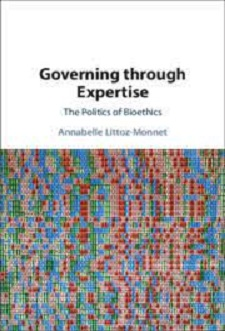Governing through Expertise: The Politics of Bioethics
Clay Wescott | 09 August 2021
Book Reviews
Governing through Expertise: The Politics of Bioethics
By Annabelle Littoz-Monnet
Cambridge: Cambridge University Press. 2020.
Starting in 18th century Europe, ideas were rolled out of continuous improvement of living conditions based on science and sympathy to enhance human flourishing. Since then, scientific and technological advances have enabled the drastic improvement of life for nearly all our world's people in food, health, life expectancy and knowledge, with the most rapid, wide-ranging improvements in the last 50 years or so (the last 100 years for Europe and North America). Today, the role of science and technological innovation is greater than ever, and as always, controversial.
Most European policymakers have a pro-innovation bias, viewing it as a way to achieve more inclusive and sustainable growth. Yet, some innovations are fiercely resisted by advocacy groups, faith leaders and some policymakers. As a result, GMOs are banned in Europe, and nuclear power plant construction has stopped. In this book, Littoz-Monnet looks at attempts to address this resistance by mobilizing experts in ethical analysis of new fields of science and technology to review controversial innovations and make recommendations. She makes the case that expert advice is not just used to improve policy choices, but to legitimize scientific advances and reduce social conflict, while maintaining the appearance of consultation and dialogue. It is an effective way of insulating policy deliberation from the general public and to alternative experts, while facilitating the crafting of workable policy scenarios. Ethics experts do this by framing issues in in line with the pro-innovation bias of European officials, and terms of rational and objective analysis of technological alternatives, rather than addressing the more fundamental political values at stake.
There are three key enablers for this in the iteration between ethics experts and policymakers. The first is orchestration, where policymakers frame expert narratives by asking specific questions framing their thinking. This can be through research funding and active lobbying, in addition to framing specific terms of reference for an assignment. The second is ideational alignment, where policymakers and experts learn to approach policy issues in common ways. The third is that experts calibrate knowledge they produce to the needs of a policy debate: for example, aiming towards a compromise that all parties can accept.
This framework is tested out using three European cases looking at research on: embryonic stem cells, nanotechnology, and data protection. In each case, ethics experts came up with workable solutions that sufficiently contained criticism to continue innovative research.
Littoz-Monnet makes a distinctive contribution showing examples of how policymakers have used ethics experts to find pathways to building coalitions underpinning controversial scientific and technological innovations to proceed and hopefully produce expected benefits to improve human life. Four related issues come to mind that could be further developed going forward.
First, scientific knowledge is constantly changing based on new techniques, experiments and evidence. The scientifically informed policymaking analyzed in this book builds on a foundation of credible, widely accepted evidence from a range of scientific sources, not just those that reinforce an individual’s own policy beliefs (cf. Wagner et al., 2020). And yet, Littoz-Monnet argues that ethics experts are brought in to reinforce particular scientific narratives and help find a way to continue research despite intense controversy. There is a possible contradiction here that could be further explored.
Second, some questions cannot be answered just by science: for example, how should the cost of climate change prevention and mitigation be apportioned? Such questions will be answered differently at the country level through appropriate, participatory political processes, not through scientific experts closely linked with unelected officials. But how about at the global level, where the public has less voice? Who should decide how the global costs of climate change, for example, should be apportioned among countries? Can science ethics experts play a role?
Third, what if scientists and policymakers agree on a way forward for innovation, and then the public won’t participate? For example, many people decline to be vaccinated for flu, measles, rubella, diphtheria, polio, COVID-19, and other diseases, even though highly effective vaccines are available, and maybe free to people with health insurance. There are a host of reasons for this: people discount their own risk to disease, their legitimate concerns about one vaccine raises doubts about others, people with medical credentials stoke fear and use as opportunities for selling books and services, politicians spread misinformation for political advantage, and all these factors can be magnified by digital sharing platforms (Larson, 2018). Could ethics experts play a role here, say in helping policymakers to craft more effective messaging?
Finally, it could be useful to take some of the ideas developed here and use them to interrogate practices of evaluation of government programs. Like ethics expertise, evaluation is political in its production and mobilization, but presented as a neutral, apolitical set of concepts. Both emerged as professions in the USA in the 1970s as utilitarian frameworks drawing on notions of principalism, or universal values. A key difference is that they are deployed at different stages of the policy cycle: ethics expertise makes policy possible, and evaluation comes when there is enough policy implementation experience to tell if expected results are being achieved. What can be learned by interrogating the strengths and weaknesses of these two processes?
Overall, Littoz-Monnet has raised important issues to consider. Much more work is needed on gaining the most possible from ethics specialists in policymaking linked to science.
References
Larson, H. (2018). The biggest pandemic risk? Viral misinformation. Nature, 562(18 October):309. https://www.nature.com/articles/ d41586-018-07034-4
Wagner, P.M., Ylä-Anttila, T., Gronow, A., Ocelík, P., Schmidt, L. & Delicado, A. (2021). Information exchange networks at the climate science-policy interface: Evidence from the Czech Republic, Finland, Ireland, and Portugal. Governance, 34(1):211-228.
Clay Wescott, President, International Public Management Network and International Advisor, Centre for Governance Studies.
